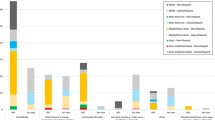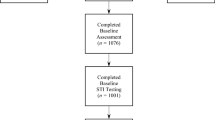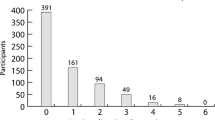Abstract
HIV/AIDS-related research requires recruitment of representative samples of MSM; yet, we know little about the comparative yield, diversity and cost–benefit tradeoffs between different recruitment venues. We compared 11 recruitment venues used for nine HIV prevention-related focus groups with MSM in Metropolitan Detroit. Of the 64 participants, 24 were clients recruited via an HIV/AIDS-focused nonprofit, 20 from Grindr advertisements, 6 from university-student email lists, and 5 from flyers/palmcards. Significantly more African–American, low-income and HIV-positive participants were recruited via the nonprofit. The best cost–benefit tradeoffs were for organizational Facebook posts, email groups, personal networking, and nonprofit recruitment. Grindr increased the size of the sample, though at greater expense. Facebook and Scruff advertisements and gay bar outreach represented greater costs than benefits. Only 11.6% of Grindr respondents attended the focus groups. A mix of online and offline recruitment venues can generate a large and diverse sample of MSM, but venue performance is uneven.







Similar content being viewed by others
References
Centers for Disease Control and Prevention (CDC). HIV prevalence, unrecognized infection, and HIV testing among men who have sex with men–five U.S. cities, June 2004-April 2005. MMWR Morb Mortal Wkly Rep. 2005;54:597–601.
Sullivan PS, Khosropour CM, Luisi N, Amsden M, Coggia T, Wingood GM, DiClemente RJ. Bias in online recruitment and retention of racial and ethnic minority men who have sex with men. J Med Internet Res. 2011;13:e38.
Parsons JT, Vial AC, Starks TJ, Golub SA. Recruiting drug using men who have sex with men in behavioral intervention trials: a comparison of internet and field-based strategies. AIDS Behav. 2013;17:688–99.
Vial AC, Starks TJ, Parsons JT. Relative efficiency of field and online strategies in the recruitment of HIV-positive men who have sex with men. AIDS Educ Prev Off Publ Int Soc AIDS Educ. 2015;27:103–11.
Woodyatt CR, Finneran CA, Stephenson R. In-person versus online focus group discussions: a comparative analysis of data quality. Qual Health Res. 2016;26:741–9.
Rhodes SD, Vissman AT, Stowers J, et al. A CBPR partnership increases HIV testing among men who have sex with men (MSM): outcome findings from a pilot test of the CyBER/testing internet intervention. Health Educ Behav. 2011;38:311–20.
Rosser BRS, West W, Weinmeyer R. Are gay communities dying or just in transition? results from an international consultation examining possible structural change in gay communities. AIDS Care. 2008;20:588–95.
Frew PM, Williams VA, Shapiro ET, Sanchez T, Rosenberg ES, Fenimore VL, Sullivan PS. From (Un)Willingness to InvolveMENt: development of a successful study brand for recruitment of diverse MSM to a longitudinal HIV research. Int J Popul Res. 2013. https://doi.org/10.1155/2013/624245.
Hernandez-Romieu AC, Sullivan PS, Sanchez TH, Kelley CF, Peterson JL, del Rio C, Salazar LF, Frew PM, Rosenberg ES. The comparability of men who have sex with men recruited from venue-time-space sampling and facebook: a cohort study. JMIR Res Protoc. 2014;3:e37.
Grov C, Rendina HJ, Parsons JT. Comparing three cohorts of MSM sampled via sex parties, bars/clubs, and Craigslist.org: implications for researchers and providers. AIDS Educ Prev Off Publ Int Soc AIDS Educ. 2014; 26:362–382.
Goedel WC, Brooks FA, Duncan DT. Approaches to sampling gay, bisexual, and other men who have sex with men from geosocial-networking smartphone applications: a methodological note. Soc Sci. 2016;5:51.
Burrell ER, Pines HA, Robbie E, Coleman L, Murphy RD, Hess KL, Anton P, Gorbach PM. Use of the location-based social networking application GRINDR as a recruitment tool in rectal microbicide development research. AIDS Behav. 2012;16:1816–20.
Grov C. HIV risk and substance use in men who have sex with men surveyed in bathhouses, bars/clubs, and on Craigslist. org: venue of recruitment matters. AIDS Behav. 2012;16:807–17.
Du Bois SN, Johnson SE, Mustanski B. Examining racial and ethnic minority differences among YMSM during recruitment for an online HIV prevention intervention study. AIDS Behav. 2012;16:1430–5.
Fortune T, Wright E, Juzang I, Bull S. Recruitment, enrollment and retention of young black men for HIV prevention research: experiences from the 411 for Safe Text Project. Contemp Clin Trials. 2010;31:151–6.
Rubin RR, Fujimoto WY, Marrero DG, et al. The diabetes prevention program: recruitment methods and results. Control Clin Trials. 2002;23:157–71.
Goedel WC, Duncan DT. Geosocial-networking app usage patterns of gay, bisexual, and other men who have sex with men: survey among users of Grindr, a mobile dating app. JMIR Public Health Surveill. 2015;1(1):e4.
Hatfield LA, Ghiselli ME, Jacoby SM, Cain-Nielsen A, Kilian G, McKay T, Simon Rosser BR. Methods for recruiting men of color who have sex with men in prevention-for-positives interventions. Prev Sci Off J Soc Prev Res. 2010;11:56–66.
Ellen JM, Bonu S, Arruda JS, Ward MA, Vogel R. Comparison of clients of a mobile health van and a traditional STD clinic. J Acquir Immune Defic Syndr. 2003;32:388–93.
Dahlhamer JM, Galinsky AM, Joestl SS, Ward BW. Sexual orientation and health information technology use: a nationally representative study of US adults. LGBT Health. 2017;4:121–9.
Rose ID, Friedman DB, Spencer SM, Annang L, Lindley LL. Health information–seeking practices of African American young men who have sex with men: a qualitative study. Youth Soc. 2016;48:344–65.
Robinson N. The use of focus group methodology—with selected examples from sexual health research. J Adv Nurs. 1999;29:905–13.
Powell RA, Single HM. Focus groups. Int J Qual Health Care. 1996;8:499–504.
Smyth H, Gustafsson M, Ganskau E. The value of trust in project business. Int J Proj Manag. 2010;28:117–29.
Gilson L. Trust and the development of health care as a social institution. Soc Sci Med. 2003;56:1453–68.
Magnus M, Franks J, Griffith MS, Arnold MP, Goodman MK, Wheeler DP. Engaging, recruiting, and retaining black men who have sex with men in research studies: don’t underestimate the importance of staffing—lessons learned from HPTN 061, the BROTHERS study. J Public Health Manag Pract. 2014;20:E1.
Funding
National Center for Advancing Translational Sciences at the National Institutes of Health Grant #UL1TR002240 (UL1TR000433). Advertisements placed at Facebook and Scruff were donated to the project.
Author information
Authors and Affiliations
Corresponding author
Ethics declarations
Conflict of interest
Loveluck, Golson and Benton were employees of Unified HIV Health and Beyond at the time of this study’s conduct.
Ethical Approval
This article does not contain any studies with animals performed by any of the authors. All procedures performed in studies involving human participants were in accordance with the ethical standards of the University of Michigan’s Health Sciences and Behavioral Sciences IRB.
Informed Consent
Informed consent was obtained from all individual participants included in the study.
Rights and permissions
About this article
Cite this article
Iott, B.E., Veinot, T.C., Loveluck, J. et al. Comparative Analysis of Recruitment Strategies in a Study of Men Who Have Sex with Men (MSM) in Metropolitan Detroit. AIDS Behav 22, 2296–2311 (2018). https://doi.org/10.1007/s10461-018-2071-z
Published:
Issue Date:
DOI: https://doi.org/10.1007/s10461-018-2071-z




